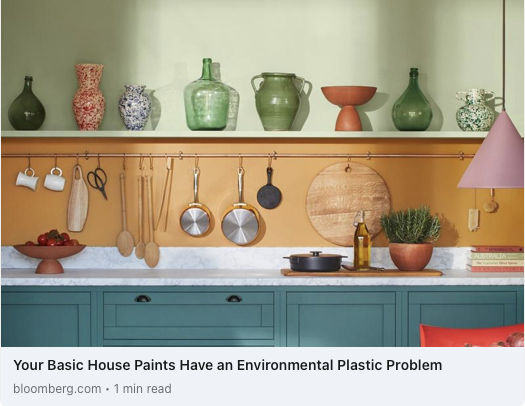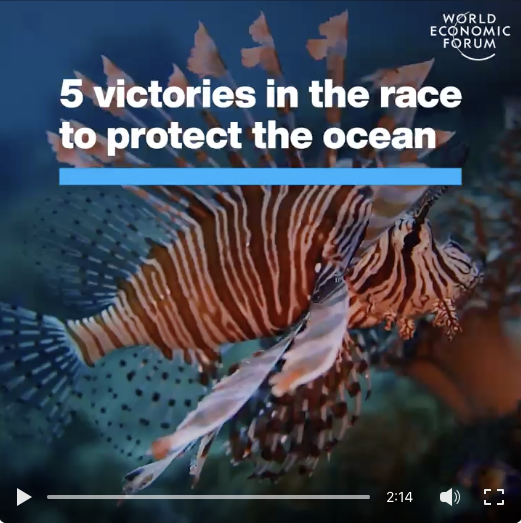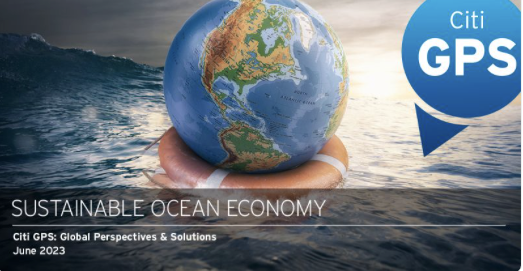|
Interesting article below by Olivia Rudgard at Bloomberg News about the issue of Microplastics in domestic Paint. 🤔
This Bloomberg News article (https://www.bloomberg.com/news/articles/2023-07-19/your-house-paint-is-causing-an-ocean-plastic-problem?accessToken=eyJhbGciOiJIUzI1NiIsInR5cCI6IkpXVCJ9.eyJzb3VyY2UiOiJTdWJzY3JpYmVyR2lmdGVkQXJ0aWNsZSIsImlhdCI6MTY4OTg0MjYwMiwiZXhwIjoxNjkwNDQ3NDAyLCJhcnRpY2xlSWQiOiJSWTFLNkhEV1gyUFQwMSIsImJjb25uZWN0SWQiOiI1RTUzMTc1QURCQ0U0Mjk2QTQ2NTE0OEQ2MTVBN0YyNSJ9.uvhUoRdRnLcUM9T2hxXPCHcAItmQHDDT7JDYFcmHHd8) raises awareness that #PaintIsPlastic, and that we need to find solutions to the problem of Mismanaged Paint - the biggest source of Microplastics in the environment (The Pew Charitable Trusts - https://lnkd.in/eS3VMRga). Domestic paints contain "only" a relatively low percentage of plastic, up to 5%, because their function is primarily decorative. Marine and Industrial paints, on the other hand, which make up about 36% of total Ocean Microplastic Leakage (Paruta et al., 2022), comprise 50%+ plastic. This is because the paint's primary function is to protect the object, which is a positive. What is not so positive however, is that an important proportion of this paint ends up in the environment, and most often the Ocean, at the time of paint application, during maintenance, and at end-of-life of the painted object i.e. Mismanaged Paint. As a result, EA - Environmental Action estimated total Paint Microplastic Leakage at 1.9m tonnes in 2019, or 58% of Total Microplastic Leakage into the Ocean - more than Microplastic leakage from tyres, textiles and pellets put together. Articles like Olivia Rudgard's help draw public and business attention to this important issue, which will in turn incite policy makers and regulators to take action. 👏
0 Comments
Keeping up a positive summer theme, here are some "Reasons to be Cheerful" (© Ian Dury and the Blockheads)!
Last week we wrote about the Citi GPS Sustainable Ocean Economy report. In that report, Dr. Ying Qin, PhD identified policy reasons to be hopeful about our capacity to build a sustainable ocean economy. Now, why not watch this short video from Friends of Ocean Action (https://www.linkedin.com/posts/friends-of-ocean-action_worldoceanday-oceanaction-bluethread-activity-7073924675080204288-TUws?utm_source=share&utm_medium=member_desktop)? It explains what multilateral Ocean treaties are being/have been negotiated, and how they seek to put in place frameworks on important Ocean Health issues from Plastic Pollution, to Marine Protected Areas, to Illegal, Unreported and Unregulated (IUU) fishing. That's the good news! However, before we can really celebrate, those words need to be turned into action. That requires governments around the world to finalise and ratify these treaties as soon as possible. Pinovo is playing its part as one of the early members of the WWF/Ellen MacArthur Foundation Business Coalition for a Global Plastic Treaty. We strongly support the Coalition's Vision of seeking a Treaty with legally-binding global rules and measures to drive change on a global scale. That Treaty can play a key role in solving the problem of Paint Microplastic Emissions, because #PaintIsPlastic! Some well written and thought provoking summer reading for you, especially if you plan to spend time beside, on, or under the #Ocean!
We were fortunate to attend an event recently where Ying Qin, PhD of Citipresented the excellent Citi GPS #Sustainable #Ocean #Economy report, of which Dr. Qin was the lead author ( 👉 this link for the report, executive summary, and video - https://on.citi/3WSCNlw). The report explains very clearly just why #OceanHealth is so important to everything from climate change to food supply to economic development, etc. etc., how UN Sustainable Development Goal (#unsdg) 14, Life below Water, is the most under funded of the 17 SDG's, and what steps should be taken to rectify this. In addition, the report includes input and interviews with a range of recognised Ocean experts, including Ted Janulis, Kimberly Mathisen, Olivier Wenden, Ronald Tardiff and Christian Lim. There are reasons to be hopeful about our capacity to build a sustainable ocean economy, as explained in the Citi report, and which we will deal with in Posts over the summer. - They include "macro" or policy reasons, such as the agreement of the Kunming- Montreal Global Biodiversity framework targeting protection for 30% of the world’s oceans by 2030. - At the level where those policies are executed, there are fantastic platforms such as UpLink - World Economic Forum , Katapult Ocean, Solar Impulse Foundation, Ocean Impact Organisation, RespectOcean, Sustainable Ocean Alliance, and OCEANOVATION that are supporting and promoting #OceanTechsolutions such as Pinovo's, that protect Ocean Health by stopping Ocean Paint Microplastic Emissions, with our Clean Blasting Technology. Because, #PaintIsPlastic! |
Archives
June 2024
Categories |
|
Pinovo AS, Sanddalsringen 5b, 5225 Nesttun, Norway
|



